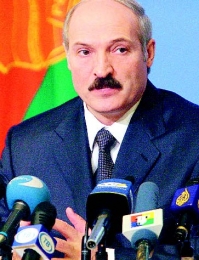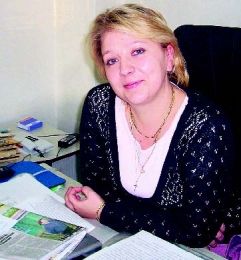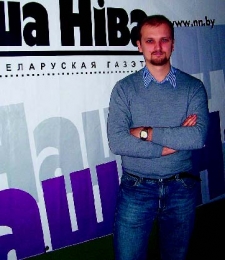Belarus’s president Alexander Lukashenko has been accused of crushing independent journalism since coming to power in 1994. Amid suggestions that his rule may loosen to facilitate economic ties with the EU, CATHERINE REILLY meets government and non-government journalists in the Belarusian capital Minsk, who tell her what they can and cannot report
It’s an editor’s office with a difference, that’s for sure. On the wall behind Anatoly Lemeshonok’s desk, sitting high and prominent, is a photo-portrait of Belarus’s controversial leader Alexander Lukashenko. To its left hangs a certificate of merit signed by Lukashenko and addressed to Lemeshonok, honouring the Respublika editor-in-chief for outstanding contributions to Belarusian life.
Sitting at his roundtable, Anatoly Lemeshonok rests his hands on a copy of Respublika, the second biggest daily produced in Belarus, with a circulation of 60,000. Adorning its front page is a photograph of a confident-looking Alexander Lukashenko, commonly referred to as “Europe’s last dictator” by the western media, but better known among Belarusians as Batka, or father – a term used both affectionately and sarcastically.
Respublika and Sovetskaya Belorussiya – Belarus’ biggest daily, with a circulation of 500,000 in a country of 10 million – are headquartered in the same building in central Minsk, the impeccably clean capital where pedestrians are orderly and remnants of a Soviet past are frequently visible. Respublika focuses on economic and legislative news, while Sovetskaya Belorussiya has a more mainstream remit. Both are government-owned.
Lemeshonok, a serious-looking but accessible man, seems somewhat jaded by the prospect of meeting another western European journalist with well-worn questions about Belarus’s controversial media scene. The editor, who is also chairman of the government-aligned Belarusian Union of Journalists, suggests that journalists like me depart Belarus with a new set of questions: “They realise that the situation that is portrayed by the oppositional media is totally different from what it is really in life.” He says Respublika can and does criticise government activities, but there is an important catch: this criticism is never directly aimed at Alexander Lukashenko, who has ruled Belarus since 1994.
“In terms of criticism towards the president, there is the following situation,” begins Lemeshonok. “It is not directly targeted to him, but there is criticism that is massive, certainly. When we criticise agriculture, industries or banks, by doing this we actually criticise the activities of the president and the government, who are responsible for the situation.”
As Lemeshonok himself intimates, however, such reportage ultimately enhances, not harms, Alexander Lukashenko’s reputation. “As you know, our president is taking care of everything, he’s keeping everything in his hands,” he explains. “He forces the guilty ones to report to the newspaper and to him, and the council of ministers, concerning what corrective action has been undertaken.”
It’s a method of reporting replicated across Belarus’s dominant state media, which benefit from government funding, restrictions on non-government media, and an advertising market filled with state-controlled businesses. In the national newspaper sector, competition does exist for the state media but in relatively small doses – a notable example being the Belarusian edition of the Russian tabloid Komsomolskaya Pravda, which is very visible around Minsk.
Unlike the cash-strapped and heavily regulated non-government newspapers in Belarus, Komsomolskaya Pravda is a Moscow-based, multi-million dollar operation which would not be an easy tiger to tame. Likened in style to The Sun, it sometimes prints rumours concerning the Belarusian president’s private life, but generally doesn’t attack Lukashenko in a serious, political manner.
Belarus also has its own localised version of the Russian ORT channel, but like its national TV networks, this is subject to state control. The 2008 annual report of Reporters Without Borders describes media restrictions in Belarus as “very serious” and the organisation expresses concern about an incoming media law, which it fears may lead to censorship of internet news sites.
Meanwhile, several non-government journalists allege that individuals and companies are forced to subscribe to the leading daily Sovetskaya Belorussiya. “I was asking about this,” Lemeshonok tells me, “I was not investigating this issue but I was talking to the chief editor of Sovetskaya Belorussiya and I know his opinion – that at least for the last few years he has been against this process.” There were “probably cases” three to five years ago when the “bureaucrats” and “government clerks” would force people to subscribe, but not anymore, he contends. “Today this is unlikely because we have a subscription campaign together with Sovetskaya Belorussiya and you can see that nobody is forced.”
Lemeshonok also suggests that the “oppositional media” in Belarus like to crank up conspiracy theories for their own ends. Very few of them are real professionals, he says, and some use impolite language such as referring to the president as AG (the initials of Lukashenko’s first name and patronymic name). “The oppositional media sometimes break the law intentionally,” he continues, “they go to the courts and it is good PR for them because they attract attention for themselves – it is like an advertisement. “When you talk to them, they say that the government follows them, pressures them through the courts. I asked them the question, ‘Why do we government newspapers get sued more than you?’”
It is indeed a pressing query, yet is somewhat diluted by Lemeshonok’s next point – that Respublika wins 95 per cent of its two or three court cases a year. It has, he explains, “a strong legal department”. Yet the more sceptically minded would question whether Belarus’s executively appointed judiciary is even more skilled than Respublika’s legal advisors.
“I LIKE writing,” responds Anna Shadrina, a senior editor at Sovetskaya Belorussiya, when asked what ignited her interest in journalism. As a cultural and social interest editor, Shadrina is spared the internal struggle which may (or may not) affect her colleagues in the political section. But this doesn’t mean that she isn’t occasionally riled by some editorial directions. “A Belarusian girl won an international fashion competition,” she says, pointing to the bottom corner of that day’s front page. “For me, I don’t like such news on the front page... I was against it, but there were many who were ‘pro’,” she says ruefully.
Sovetskaya Belorussiya, you sense, has been good for Shadrina – in her early thirties, with her own office and a senior editorial position, she now only writes when she is emotionally “moved to”. As a non-political writer, Shadrina seems innocently detached from the newspaper’s underlying mechanics, double-checking the back page of that day’s edition to confirm that the presidential administration is indeed its owner.
But she knows the score. Asked if the newspaper can criticise the president specifically, she replies: “Well, no. But when we are criticising the bodies of the government, then we are... it is like criticising the president.” She also refutes suggestions that anyone is forced to subscribe to Sovetskaya Belorussiya. “Subscription is the major part of our circulation,” she explains, “and this is true, there was a time when the local regional authorities would recommend the government organisations to subscribe to this newspaper.”
This had “a very negative impact” on the paper’s image and Shadrina says that, to her knowledge, it no longer happens. She published the same question on her weblog but received no evidence of such actions still occurring, she adds. Therefore forced subscriptions are not government policy, she is asked. “I think no,” she says, following a long pause.
According to an independent analysis of Sovetskaya Belorussiya, commissioned by Metro Éireann, the newspaper “strives to be modern and interesting” and covers “a wide variety of subjects”. The analyst, who surveyed the paper during October 2008, continued: “It also conducts journalistic investigations and regularly raises poignant social issues… However, at the same time many examples show that when it comes to support of the Belarusian president, all plurality of opinion and veneer of modernity disappears completely.
“The paper has shown that it is willing to overlook inconvenient facts, bend truth, quote people out of context, fall into unexplained silence and rationalise after the fashion of Marxist ideologues – all in order to avoid questioning president Lukashenko’s authority.”
Nevertheless, Shadrina is upbeat about the role of Sovetskaya Belorussiya. “This newspaper tries to give everything,” she says, “but I don’t know why. Probably we try to be the best.”
She also mentions that many new recruits are sourced from the Belarusian State University’s journalism department. “They come to do practice and then, if they are the most talented, they have the chance to be employed here, once they graduate.”
A BEAM of winter’s sunlight protrudes through the open blinds into an office in Minsk. Svetlana Kalinkina, deputy editor at oppositional newspaper Narodnaya Volya, moves towards the window to pull the blinds, and rests her mind on an irony that continues to mesmerise.
“Alexander Lukashenko came into power in the short time when the media was more or less free... he was using that advantage,” she says, recalling the Belarusian president’s meteoric rise to the top, 14 years ago. “But probably the first thing he did when he came to power was to simply take the media under his personal control. His long ruling for so many years is virtually based on a very skilled use of propaganda and managing the media – and this is a tool he won’t let out of his hands, no way.”
Kalinkina is a prominent name in Belarusian journalism, having been editor of a popular business daily which came under severe restrictions from authorities. (Kalinkina was awarded a Committee to Protect Journalists award in 2004 in recognition of her efforts in this regard.) She is also co-author of An Accidental President, a critical book on Lukashenko’s presidency which is banned in Belarus, and is also the subject of a court case after the KGB state security service seized a copy from an individual crossing the Polish-Belarusian border. It is, say the prosecution, ‘extremist’ material.
Narodnaya Volya, where Kalinkina is now deputy editor, has also been through numerous court cases. “There is no limitation in the state legislation on how much money a person can claim for writing something wrong, so lots of officials started suing the newspaper in the courts, trying to allegedly protect their moral image,” she says.
Belarusian journalists now operate in an environment where journalism has been strangled, she has previously suggested, and journalists are forced to take sides. (However, Narodnaya Volya does not use ‘AG’ to refer to the president, or use any other impolite title.)
But could this situation be about to change? In recent months, Belarus has been warming its frosty relations with the European Union, with a view to enhancing trade links. The country’s reliance on cheap Russian oil and gas has come under strain, and Lukashenko’s government has been reviewing its options in the face of economic difficulties. Last October, following the release of political prisoners in Belarus, the EU suspended a travel ban on Lukashenko and a number of other officials. And last week (after my interview with Kalinkina and others in Minsk) Narodnaya Volya and another oppositional newspaper, Nasha Niva, appeared at state-run kiosks after years of being frozen out of the government’s monopolistic distribution, subscription and printing systems.
Following recent developments, Narodnaya Volya can now be distributed by BelPochta (the postal system) and by SoyuzPechat in their kiosks. It appears that, preceding this, a leading official in the presidential administration wrote to the European Union announcing that barriers faced by non-government media would be removed.
Demand for Narodnaya Volya has since been high, Kalinkina later informed me, but she remains highly cautious about the situation. The commercial terms and conditions are not good, she feels, and it’s a concession that can be easily retracted if EU–Belarusian negotiations come to nothing. Furthermore, several other non-government newspapers continue to be omitted from the state’s subscription and kiosk systems.
During my visit to the office of Narodnaya Volya, just before this development, I had seen the apparatus through which the paper was managing to survive: the latest edition of the bi-weekly had returned from Smolensk, Russia (it was not allowed to be printed in Belarus) and it had no advertisements (advertisers having been scared off through ‘impromptu’ visits from tax officials, according to Kalinkina). By all accounts, the paper should have died, and financially it is unclear how it has kept going, with Kalinkina only referring to donations from readers. Its circulation varies, but most recently has ranged from 15,000–20,000.
A group of pensioners had gathered in the office to help distribute it in Minsk. “We’re prompted to do this because we are Belarusians,” Taissia Sack, a diminutive pensioner who began busily packing the paper, told me. “We are the patriots of our country and we want to help the newspaper because it was thrown out from our country. But for Narodnaya Volya, we have no other source of independent information here.”
Certainly, Narodnaya Volya prints stories that wouldn’t appear in the state media, but a more fitting description of its content would be ‘oppositional’ rather than ‘independent’. Indeed, there are also very practical barriers to balancing one’s articles if you work for Narodnaya Volya.
It was a quiet afternoon in the paper’s newsroom, with most of its eight staff journalists on lunch-break, but senior reporter Ales Sivy had his ear pressed to the phone, and was busily taking notes. Sivy previously worked for the parliamentary newspaper Narodnaya Gazeta (which used to produce one million copies, and also suffered a state clampdown). He has reported from Bosnia and Georgia, yet one of his most memorable assignments was much closer to home: Sivy told me he was in Alexander Lukashenko’s hometown back in 1994, when news of his presidential victory broke, and had the opportunity to speak at length with the president’s wife.
“We stayed in a hotel that was opposite her house and would actually visit her from day to day,” he recalled, sketching the details of a feature story that most journalists could only dream of. "There was also Dimitry and Viktor, two sons of the president – they were kids then. We helped her to take the cow into the field, we helped her to take some cucumbers from her garden. And she was reading us poems written by the president,” he says. Were they any good? “They were normal,” replies Sivy.
These days, Sivy is frustrated in his attempts to get comments and information from officials – a practical barrier which fundamentally harms the reputation of the non-government media. “It all depends on the person,” said Sivy, when asked if officials return his calls (some of whom also face restrictions in dealing with the media). “But generally, they usually refuse, or ask not to give any name.” Sometimes he is stopped from attending events without any reason, despite the fact he possesses a recognised journalist’s card. Interestingly, Sivy noted that associates in the state media sometimes pass on information that they are forbidden from using.
Other controversial measures remain in place. Journalists who are deemed to have insulted the president or the state are open to criminal charges and jail time, rather than civil defamation proceedings.
“We are always under threat of getting into criminal trouble,” Svetlana Kalinkina said.
BEING unable to get comments and information from state officials is one of the biggest impediments facing non-government journalists, according to Aliaksandr Kudrytski of Nasha Niva, a Belarusian language weekly for oppositionally minded intellectuals.
“Well, how do you write about state affairs if you are not allowed to have normal relations with state officials?” he wonders.
Nasha Niva, founded in 1906, has a rich and traumatic history. Like Narodnaya Volya, it is low on detail when it comes to questions on how it finances itself. Kudrytski says it circulates just over 2,000 copies (it was, alongside Narodnaya Volya, admitted into kiosks last week), and takes its historical mantle seriously, publishing feature-length articles on figures from Belarus’s past, especially periods of history that are now underplayed. It’s also careful to carry economic news, in order to counter the relegation of the Belarusian language as simply a mode of communicating historical and cultural matters. Kudrytski says Nasha Niva is as much a community as it is a newspaper, and also lists book publishing among its activities. The paper is oppositional in tone, but this does not stop it criticising the political opposition, and it “tries to be careful, and correct”, says Kudrytski.
Interestingly, Kudrytski is a 2003 graduate of the Belarusian State University’s journalism department, and confirms that some of his former classmates now work in the state media. However, more potently, many have disappeared off the journalism radar altogether.
Unsurprisingly, Kudrytski maintains a certain caution concerning Belarus’s dalliance with the EU, and fears that the incoming media law will be switched on and off like a tap, as the authorities see fit.
“If they want better relations with Europe, maybe the law will be mild,” he reasons, “but when the whole story of friendship with Europe is over, the law could be used to wipe out the rest of the independent press.”
However, Alexander Yushkevich, chairman of the Permanent Commission on Human Rights, National Relations and Mass Media at Belarus’s house of representatives, suggests that fears over the new media law are unfounded. “I wouldn’t say that the law has any new intent that wasn’t in the previous edition of the law,” he says. Does his committee meet with the non-government media? “We communicate with the largest mass media,” he says, “and then if we have any other opinions that are different we try to listen to them.”
Ten people fill the small room that is home to the Minsk-based Belarusian Association of Journalists (BAJ), an organisation mostly comprised of non-government journalists. Some are busy photocopying, others tapping away on computers. In a corner, three people are in deep conversation with the association’s chair, Zhanna Litvina.
According to the BAJ, it is funded by membership fees and voluntary payments. It was also a winner of the Sakharov Prize of the European Parliament.
Two photo portraits hang on the main wall. One is of Dzmitry Zavadski, a TV cameraman who disappeared in July 2000 and is officially classified as dead. The other is of journalist Vieranika Charkasava, who was murdered in her apartment in October 2004. Suffice to say, the BAJ feels that both these journalists may have been murdered because of their professional activities.
“It’s obvious for me that Lukashenko and his administration is trying to play games with the west,” the association’s international officer Andrei Aliaksandrau says, as we speak in a moderately busy cafe next door (in an interview which also took place before the easing of restrictions on Narodnaya Volya and Nasha Niva).
Aliaksandrau says he believes the Belarusian government has been searching for a “balance” that helps maintain power – a balance that can be achieved through continuing to get cheap Russian oil and gas – “this is the essence of the Belarusian economy” – and developing greater economic cooperation with the rest of Europe.
And Europe is talking. “I understand that Europe is quite tired of Lukashenko and it feels like European politicians just don’t know what to do with ‘this Belarus’,” he says. “So they are trying to find new ways of communicating. And there is a very popular word among European politicians now, which is a dialogue. Everybody wants a dialogue. Because they say if there is no dialogue there will be no improvements. And this is right.
“But the key issue to my mind is what we understand by the word dialogue. It’s very important for us, the people who keep struggling within the country, that we believe in certain democratic values, and we think these values should not be questioned. Europe should be prepared for playing games.”
Big challenges hover on the horizon. In February, the new media law comes into force which requires news outlets to re-register, and which could also see a clampdown on internet news sites.
“The most dangerous thing is uncertainty,” says Aliaksandrau. “The problem is not that the law regulates the internet but that it gives the power to the government to do so.”
On the fact that all media outlets are to be re-registered, he comments: “Our experience shows that this can be dangerous for the existence of some newspapers... it’s very difficult to register a newspaper, it’s not easy to re-register an existing one, and it’s a serious danger to deal with something that is not registered.”
Aliaksandrau says it is difficult to stay “calm and unbiased” in the face of pressures from the state. In March, he was among a number of non-government journalists whose workplaces and accomodation were searched by the KGB in relation to a case of alleged libel against the president. “The KGB representatives stated that some materials, related to the case, might have been stored in the apartments and editorial offices. The case related to satiric cartoons about president Lukashenko, but it is obvious the real reason for the searches was different.”
Despite such pressures, Aliaksandrau feels the non-government media manage to cling on to their journalistic values, noting that BAJ monitoring of the media coverage of last September’s parliamentary elections (which saw no opposition candidates elected) found that the non-government media had generally fulfilled the remit of informing the public, while the state media had not.
Strongly oppositional newspapers like Narodnaya Volya can be “quite sharp” in their reportage, admits Aliaksandrau. “But I cannot say that they fail to meet the professional standards.”
deputyeditor@metroeireann.com















